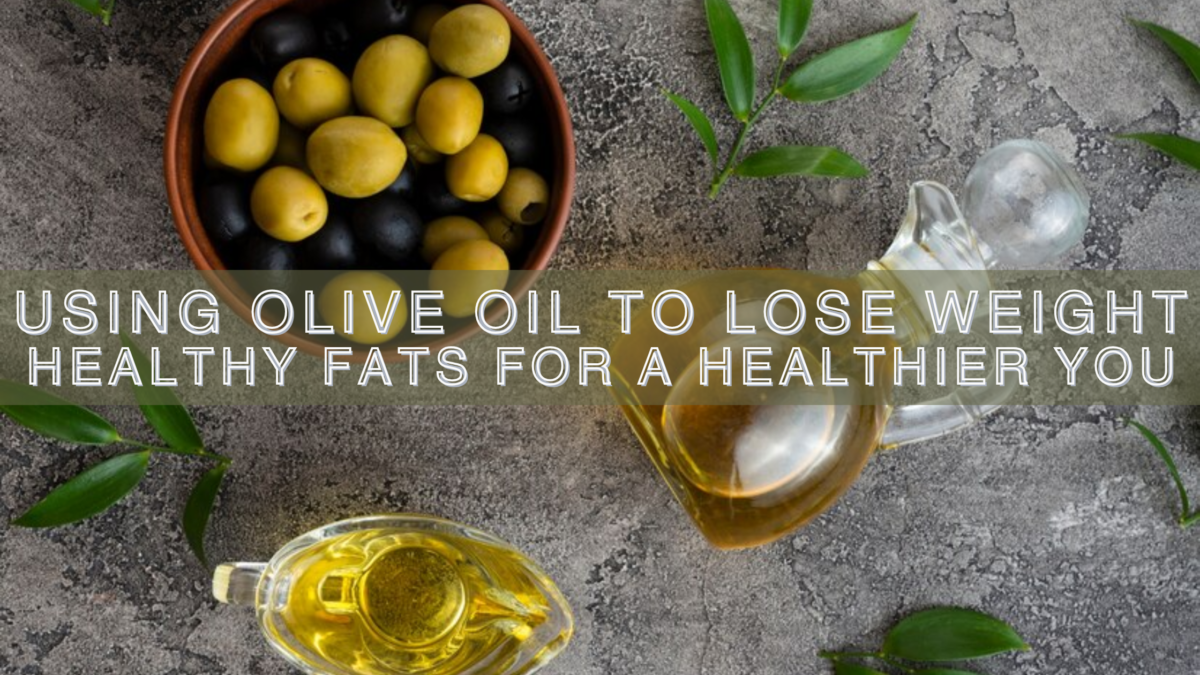Healthy Fats for a Healthier You: Using Olive Oil to Lose Weight

How Healthy Fats in Olive Oil Help to Lose Weight?
When it comes to weight loss, finding foods that fit seamlessly into a balanced diet can make all the difference. Olive oil for weight loss has gained traction due to its unique health benefits and versatility. Used for centuries in Mediterranean diets, olive oil offers a potent combination of heart-healthy fats, metabolism-boosting compounds, and appetite-suppressing effects. Here’s why olive oil might just become your new go-to friend for a healthier lifestyle.
The Power of Healthy Fats in Olive Oil
Olive oil is rich in monounsaturated fats, which are known for their heart-healthy properties. But did you know that these fats also play a significant role in weight management? Unlike trans fats and processed oils, the monounsaturated fats in olive oil help reduce inflammation and promote satiety. By keeping you fuller for longer, olive oil makes it easier to manage hunger and avoid excessive snacking.
Olive Oil and Appetite Control
Olive oil contains a compound called oleic acid, which stimulates the production of a hormone that helps regulate appetite. This can be particularly helpful for those who struggle with portion control. Including a tablespoon of olive oil with meals can help prevent overindulging by signaling your brain that you’re satisfied, reducing the need for large portions or between-meal snacks.
Metabolism-Boosting Properties
Healthy fats, like those in olive oil, have been shown to support a higher metabolism. By integrating olive oil into your diet, you might give your body the extra boost it needs to burn calories more efficiently. The antioxidant-rich profile of extra virgin olive oil also promotes cell health, which is essential for a well-functioning metabolism.
How to Add Olive Oil to Your Diet for Weight Loss
- Morning Kickstart: Begin your day with a teaspoon of olive oil to jumpstart your metabolism.
- Salads and Dressings: Use olive oil as a base for homemade salad dressings or drizzle it over fresh greens for added flavor.
- Cooking Substitute: Swap out butter or other cooking oils with olive oil when sautéing or roasting vegetables.
- Pre-Meal Boost: Take a small spoonful of olive oil before meals to help with appetite control.
Choosing the Right Olive Oil for Weight Loss
Not all olive oils are created equal. To get the most health benefits, opt for extra virgin olive oil, which is the least processed and retains the highest levels of antioxidants and essential nutrients. Extra virgin olive oil is also cold-pressed, preserving its beneficial compounds better than other types.
A Few Precautions
While olive oil has numerous benefits, portion control is essential since it is calorie-dense. A tablespoon contains about 120 calories, so using it sparingly and mindfully can help you enjoy its benefits without overdoing it.
Also Read: Finding the Best Bariatric Surgery in Delhi: What Makes it Stand Out?
Final Thoughts
Olive oil is more than just a tasty addition to your meals. Its healthy fats, metabolism support, and appetite-suppressing effects make it a valuable asset in any weight loss journey. Incorporate olive oil into your diet in a balanced way, and let this nutrient-dense oil be your partner in achieving your weight loss goals!
Discover the potential of olive oil for weight loss! Start incorporating this versatile oil into your meals today and take a step toward a healthier you.
FAQs: Olive Oil
1. How much olive oil should I use daily for weight loss?
Most health experts recommend 1-2 tablespoons of olive oil per day for its health benefits. However, because it’s calorie-dense, it’s best to use olive oil in moderation within a balanced diet.
2. Can olive oil alone help me lose weight?
While olive oil supports weight loss due to its healthy fats and satiety benefits, it’s not a magic solution. Incorporating olive oil along with a balanced diet, regular exercise, and other healthy habits is essential for sustainable weight loss.
3. What type of olive oil is best for weight loss?
Extra virgin olive oil is the best choice for weight loss. It’s less processed and contains higher levels of antioxidants and healthy fats, which help maximize its health and weight loss benefits.
4. Should I take olive oil on an empty stomach for weight loss?
Some people believe that consuming a small amount of olive oil on an empty stomach can boost metabolism and digestion. While there’s limited research on this, adding olive oil to meals or using it in cooking can still be effective for weight loss.
5. Can I use olive oil for cooking and still get weight loss benefits?
Yes! Olive oil is versatile and great for cooking at moderate temperatures. Drizzling it on salads, using it in marinades, or lightly sautéing veggies in it can help you enjoy its benefits without compromising its nutrients.
6. Does olive oil help with belly fat reduction?
Olive oil’s monounsaturated fats and antioxidants support metabolism, which may help reduce belly fat over time as part of an overall healthy lifestyle. However, spot reduction isn’t possible; weight loss must be approached holistically.
7. Can olive oil replace other fats in my diet?
Olive oil is a healthy alternative to saturated fats like butter or margarine. Replacing unhealthy fats with olive oil in your diet can support weight loss and improve heart health.
8. Are there any side effects of using olive oil for weight loss?
Olive oil is generally safe and beneficial when consumed in moderation. However, excessive consumption may lead to calorie overload, potentially causing weight gain, so it’s best to use it in mindful portions.
9. What are other benefits of olive oil besides weight loss?
Olive oil supports heart health, reduces inflammation, promotes brain health, and is rich in antioxidants. These benefits make it an excellent choice for overall wellness, not just weight loss.
10. Is olive oil better for weight loss than other oils?
Olive oil’s monounsaturated fats and antioxidants make it a preferred choice for weight loss compared to oils high in saturated fats. However, combining it with other healthy fats, like avocado or flaxseed oil, can diversify nutrient intake.






